#jlpt results
Text
To those who passed, 合格おめでとうございます!
To those who didn't, また今度頑張ってね!
Taking the JLPT is a big step, and no matter the results, you have grown so much. Well done all!
39 notes
·
View notes
Text
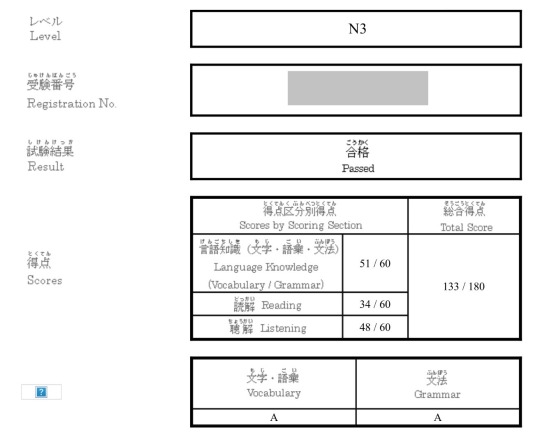
I WAS SO NERVOUS OMG
#student#studyblr#australia#languages#japanese#jlpt n3#jlpt#japanese language#i-passed!#exam season#exams#omg#totally had low blood sugar after the exam#JLPT results#results
5 notes
·
View notes
Photo

日本語能力試験N3を合格した!!!合計180点満点中99点だ。安心だった。よかったー。
(I legitimately thought I was gonna get somewhere between the 80 and 94 mark so getting above 95 was a grand surprise :D)
1 note
·
View note
Text
Guess who passed their JLPT??? this bitch!!!!!
0 notes
Text
this is incredible btw
i've always had english text when i play games (but japanese audio whenever i can, except for utapri for obvious reasons)
so me completely playing xv in japanese text is... yeah
#n plays ffxv#the result of over 10 years of japanese study#i passed N1 of the jlpt in the last december exam#but when i play games i like to turn off my brain a bit so i tend to play in english#(makes me less overwhelmed)
1 note
·
View note
Text
I passed N2 btw lmao
#but kinda barely because i got EXACTLY 30/60 from reading section so if i had one less point i would fail the entire exam lmao#but i passed it lmao#then i got 40/60 from vocabulary/grammar and 41/60 from listening#so i had 111/180 points#so not exactly a spectacular result but i passed nevertheless lmao#now it's time to prepare for N1 next year lmao#jlpt
0 notes
Text
A somewhat overdue update
Under the cut because this story might get long...
I started to boycott Twitter (now X) in mid-September 2023 because of the potential paywall I heard about around then. To this end, I deleted my original Twitter account some time around then (either end of September or November, I can't recall). This boycott obviously impacted my ability to be "Boueibu reporter", as I used to call it.
Somehow, the Japanese-language anime fandom has held on after that and I had to create a burner account after a certain point, since I'm still in the Hypnosis Mic fandom (and still regularly following/translating tweets for the mobile game in particular - see here for those).
I went back to the Boueibu Twitter account to see if I needed to turn notifications on for said burner account...Surprisingly, I did need to. The account had carried on without me, albeit with far less activity than it used to have - it's mostly merch and cake tweets now.
It's been almost 10 years since Boueibu's heyday (the first Boueibu update I can recall dates to late November 2014). I've changed, Twitter's changed, Tumblr's changed and most of the Boueibu fandom has scattered to other fandoms.
In early 2024, I'm making it as a professional translator, but feedback I've gotten is proving, once again, I'm extremely imperfect as one. You could argue it's time for me to move on.
On the other hand, I failed the JLPT in 2022 and attempted it again in 2023, but results for this latest attempt aren't out for at least a week. I also don't have enough confidence to throw a bunch of money - several times the JLPT amount - to attempt a national translation qualification test.
Basically, I've come to a crossroads: continue translating Boueibu tweets, or not? Out of nostalgia and a continual need to improve, I say "I'll continue". However, out of a commitment to translation ethics (which I learnt about in the almost-decade since starting mg&c) and a final optimal product, I'll be more thorough this time. (e.g. I intend to provide links to original texts out of transparency.)
(I'm not going to tell you my burner account's handle in case it goes down.)
Also, the Fairy Ranmaru blog posts. I still intend to work on those (I'm still on Balletta's first post...it's been years since episode 3 first aired, so I might have to edit it thoroughly before I post it to make it match my current level of translation skill), but they're a very low priority and, as previously announced, are on a different blog.
TL;DR:
There are tweets missing from mg&c from Sep. 2023 - Jan. 2024 due to changes on Twitter. I intend to translate these missing tweets in a slightly revamped way to what I used to do previously, so expect them soon. After that, I'll keep looking out for Boueibu tweets, but they will become a lower priority.
Fairy Ranmaru blog posts are still going ahead on the Animanga Spellbook.
22 notes
·
View notes
Text
Let's Learn Natively (TL :Japanese) | Reading
Why it's important to read as much native materials as you possibly can in your target language and where/how to start.
※ When learners first embark on their journey of picking up a new language, the first thing we do is familiarize ourselves with the alphabet, pronunciation, and other important innerworkings on the language. With Japanese, the first step is to learn hiragana and katakana. A lot of people stop in the middle of that because they feel that it's not worth learning the language if they have to learn that many letters. But what if you've made it past that point? Where do you go from there? Of course, we move on to basic grammar and sentence structure so that you can begin to understand why sentences are formed the way that they are. (and, of course, vocab words).
※ However, while textbooks and workbooks do teach us the way that sentences are formed, it's stiff. Of course, the purpose behind that is to make sure that you understand the basics before you move on to more native/nuanced versions of the structures. But once you're ready to do that, where do you go? Click below to keep reading:
★If you're ready/interested in reading native material, and you don't know where to start, I highly recommend trying out Natively. Think of this as a goodreads for Japanese learners.
★If you're concerned about picking a book or series that's too difficult or too long for you, the website has already taken that into account. The website is structured so that all of the books and series that are on there are added, graded, and reviewed by fellow Japanese learners. The grading system that is utilized goes from Level 0 to Level 41; the grades roughly correspond with JLPT levels (if you're preparing for the JLPT and are trying to prepare for the reading comprehension section). You can learn more about the grading system by clicking here.
★The website includes all sorts of books: textbooks, graded readers, light novels, manga, novels, children's books, short stories, and other kinds of books. When you click on a title or see it in the search results, the color coded grade will pop up next to it. These grades are user-determined. When users finish reading a book, we're prompted to grade the difficulty level in comparison to other books that we may have already read. In doing so, the difficulty level of the book might change when calculated in with other reviews. The point of this is to help fellow learners gauge what types of reads you find find difficult and which ones you find to be easy. Here's an example photo:
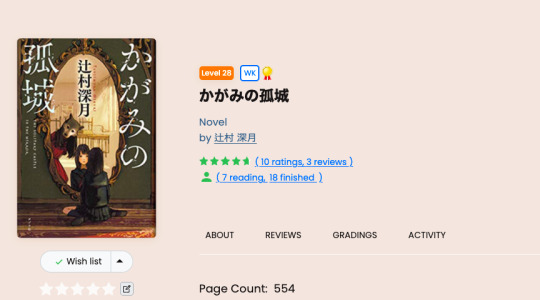
☞Caveat: don't feel discouraged if you found a book to be difficult even though it didn't seem like it would be. Everyone thrives in different areas and different subjects. Just because something was graded at N5 and you had difficulties with it at N3 doesn't mean anything--it might mean that it wasn't something to your liking. There are some series that I have difficulty with because of pacing or because I lacked interest in it.
❀ If you're worried about reading a book or series on your own and you're looking for friends to read and discuss about it with, come join us over on the discord and propose it as an option in the bookclub.
㉄ Can't find a particular book or series that you're looking for on the website? You can request for it to be added here.
★ The website is also equipped to let you "organize" your library into categories and track your reading progress. Additionally, you can make your library and reading progress private if you don't want anyone to see. As I'm currently using this blog to be as open as I can possibly be on my language learning journey, mine is made public. Feel free to check me out on the website.
★This is not sponsored, but if you receive a welcome message from Brandon, the owner and creator of the website, tell him that maobuchou sent you (that's me! ☺️). Brandon is really nice, so if there's anything that you're confused about or if you have suggestions for the website, he has an option for you to contact him.
★If you're interested in seeing what I'm currently reading, what I'm interested in reading next, and what I've graded thus far, click here to follow me (I'll follow back). Following other users allows you take a peek at what books they're reading. I also update my profile to say what book is also being read in the discord bookclub.
There will be more posts to come in the future about ways to become comfortable with reading in your target language.
#onigiristudies#japanese#learn japanese#nihongo#jlpt#resources#natively#jlpt n3#jlpt n2#jlpt n4#jlpt n1#jlpt n5#japanese grammar#japanese vocab#japanese langblr#learning japanese#langblog#japanese vocabulary#japanese studyblr
460 notes
·
View notes
Note
Hello, I'm the owner of the Traditional Chinese Evillious translation blog you and an anon mentioned, thank you for the mention! I have a question to ask, how do you translate novels so fast? It seems like you can get a book done in weeks, and I have been translating for almost three years and I haven't even have three DSoE novels translated. I really admire your determination and quick pace of how you do your work.
You're welcome! And hmm, that's not an easy question to answer.
I think it mostly comes down to experience. I wasn't always that fast--when I first started it would take me a few months to translate a novel rather than a few weeks. My Japanese wasn't as good and there were a LOT of things that I needed to look up extensively to understand them, or phrases I wasn't used to and so had no idea how they should be translated.
I think the biggest thing that's helped is just improving my fluency in Japanese. I was attending college courses on Japanese during a huge chunk of my translations, and after graduating I also studied a bit more to pass the N3 and N2 levels of the JLPT. So while in the beginning it was something of an active struggle to get the books translated, by the end here I could translate pretty much at the same speed as I could read (granted, I'm sure the prose style in my translation is a little dull as a result).
There's other little things too--I'm a fast typist, I have some interest in creative writing so words come naturally to me, etc. But I do think it's one of those things where the more you work on it, the easier it gets over time. It definitely takes a while, though.
#also to be fair the most recent book i did was oss punishment#which is shorter than most of mothy's other novels#and mothy's prose in it is very fast-paced#also i was going full speed ahead because i wanted to see the reveals in it#generally i wouldn't advise translating for more than 6 hours a day unless that's your job
10 notes
·
View notes
Text
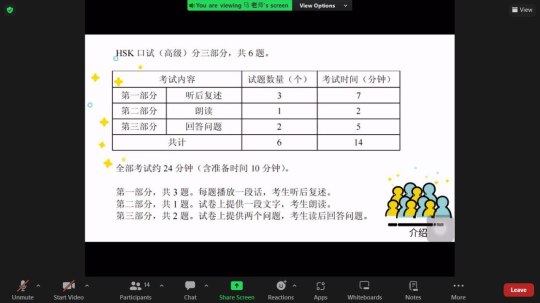
I'm a week late lol but I have updates!!
- Started taking HSKK (Chinese Speaking Proficiency Test) advanced prep class :D We're all advanced learners in here with HSK 5/6 levels so the teacher is speaking in Chinese the whole time and I'm so happy that I can understand 99% of what she's saying but also I found out my Chinese speaking has really diminished 😭 Thank god I was able to introduce myself and answer her questions in Chinese but the mock tests are kicking my ass no doubt.
- J.Test (Japanese language exam) released the correct answers and I got enough marks to pass JLPT N3 level!! I'm still waiting for formal result announcements but I'm pretty sure I got it!! :D
- Started teaching a new basic Chinese class so now I have to teach 4 days per week. It's a bit tough but I think I'm making it work?
- the level 1 Chinese class I'm teaching is going to end in February so I'm gonna have to prep for the level 2 class and THEN prep and record my basic Korean classes. I'll tell y'all how it goes
- I have 100% grade but still missing classes for Pali Diploma and will have to make up a lot in the future. Thank god they don't grade attendances 😭
- I have a slight fever right now so I'm chugging Lipovitan-D to keep me going. I have a tarot session booked this afternon and a chinese class to teach so can't really rest Unfortunately :/ but Dimension 20 FHJY is helping me with my mood.
Anyways that's all! happy studying, y'all
#hskk#hsk#hskk advanced#hsk 5#hsk 6#chinese study#chinese langblr#j.test#jtest#j test#j-test#jlpt n3#japanese langblr#pali studyblr#pali langblr#pali language#tarot reader
9 notes
·
View notes
Text
jlpt certificate came in :) i already knew my score cause it was posted online a couple months ago but the certificate comes with a results piece of paper that also says your percentile ranking and it turns out i scored in the 91st percentile???!?!?!?!? i thought i did just okay and felt kinda bad that i could have done better but it turns out even that counted as a high score??!?!?!? whoaaa
6 notes
·
View notes
Text

RESULTS ARE OUT and i successfully passed my jlpt n2 exam!! hallelujah
18 notes
·
View notes
Text
In July 2011, I took the JLPT, N1 level, and passed!
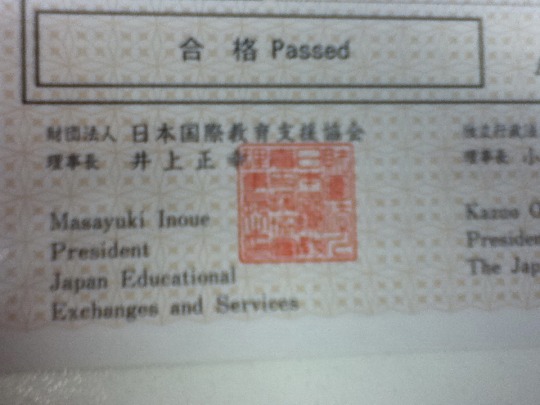
Unfortunately, I promptly lost the postcard they sent with the results, and while no employer or government agency has ever asked me for proof I had N1 certification, I regretted not hanging on to this important document better.
And then this year I learned you can get your results reprinted, and all you need is the precise date of the test you took (something I determined from the time stamp on the above pic and old chat conversations about taking the test), your name, and a picture of your passport with your name and birthdate on it. This was great since I’d DEFINITELY lost my application number.
Three days later…this came!
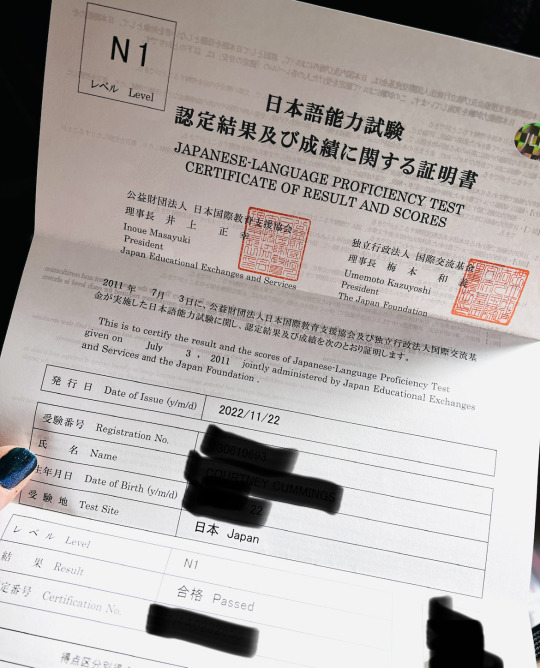
Validation at long last \o/
78 notes
·
View notes
Text
About my translations
This post is meant to give you an idea of my skills and approach to translating, so you can go in informed of how it impacts the final result of what I post. I may add to this if it becomes worthwhile to do so in the future.
What I am
I have learned Japanese basically entirely through immersion as an exchange student and self-study.
I passed the JLPT at the N3 level during the July 2022 exam, and I plan to sit for the N2 in 2025. (There is too much going on in my life to do it in 2024.)
I began translating for fun in the spring of 2022 as a supplement to my JLPT studies, and I've been doing it ever since. I am only beginning to share these with others in spring 2024.
My husband is a native speaker, who I check with when I am unsure about my translation of something.
What I'm not
I have never taken Japanese as a second language, i.e. in the traditional school setting. In my experience, the result of this is that my skill is unusually high in some places and unusually weak in others, compared with people who learned it in a class made for foreign students.
I am not certified in any way as a translator - everything I do is based on the results that I personally feel give the best translation with the lowest amount of loss. I will be the first to tell you that there may be ways to do it better, but I only have myself as a teacher at this point. (Someday, I hope to change this.)
How I translate: I use a combination of tools to answer questions about words or phrases I don't know. These include Google Translate, Japanese forums for learning English, and Japanese dictionaries. I have an app called KanjiLookup for kanji I don't know. I want to note that I do not use machine translation (like Google translate) for entire sentences at all; if I can't grasp what's written without it, I double check with my husband to ensure accuracy.
Intent of text vs. direct-as-possible translation: I have tried both ways and translating intent into more natural language that captures as much meaning as possible produces better results imo. Especially in Japanese, direct translations are often stilted and I feel actually diminish what you take away from it sometimes if you don't speak both languages.
Translator's notes: I recently realized I could shove my opining and bonus fun facts into these. I try to use them if I think knowing what the direct translation was is useful or insightful, or to capture additional cultural context a reader may or may not know.
As a final note: while I am doing the best I possibly can to provide a quality translation, I am fallible and certain I will make mistakes sometimes. If you spot these, please DM me or send me an ask explaining what I did wrong, and how you would have done it differently instead. I'll review, and if I make a correction, will credit you in the edited post.
4 notes
·
View notes
Text
also i got my JLPT results certificate in the mail today ^-^ feeling very hopeful and not despairing at the moment. but i am a little sleepy.
3 notes
·
View notes
Text
ために
It means "for the sake of", "for the benefit of", and it also means "because of", "as a result of", "since".
Its first meaning is very similar to ように, but according to what I've researched, ために is used mainly with the speaker's volition, while ように is used to achieve certain conditions or states (not necessarily related to the speaker).
It's quite hard to differentiate T_T Maggie-sensei explains it quite well though. The video below also explains the nuance well, that ように is used mainly with Potential verbs and Stative verbs. ように can also be used with the ない-form of verbs, but ために cannot.
Examples of Potential verbs:
話す → 話せる
食べる → 食べられる
持つ → 持てる
Examples of Stative verbs:
分かる
聞こえる
見える
Another difference is that ように is used with verbs only (plain/dictionary form), but ために can be used with verbs, nouns and adjectives, as tabled by JLPT-sensei here:
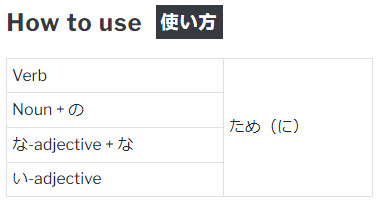
Verbs should be in their plain/ dictionary form.
youtube
#tame ni#japanese#nihongo#japanese language#japanese langblr#minna no nihongo#studyjapanese#japanese grammar#chapter 42#Youtube
42 notes
·
View notes